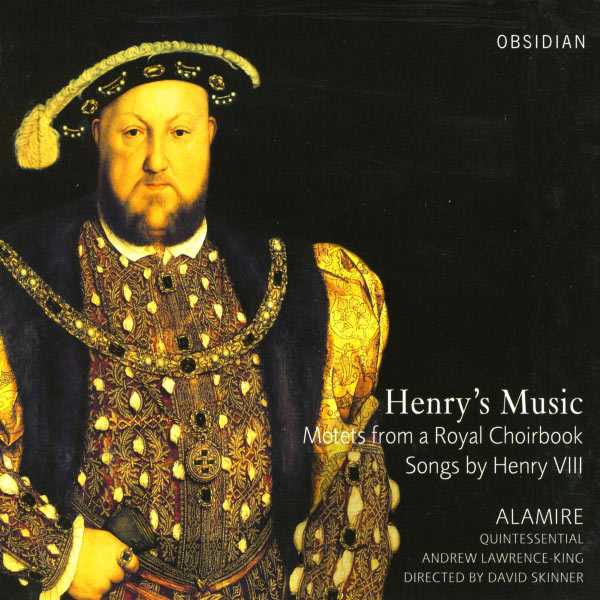
Composer: Robert Fayrfax, Henry VIII, Benedictus de Opitiis, John Taverner, Philippe Verdelot
Performer: Alamire, QuintEssential, Andrew Lawrence-King
Conductor: David Skinner
Format: FLAC (tracks)
Label: Obsidian
Catalogue: CD705
Release: 2009
Size: 351 MB
Recovery: +3%
Scan: cover
01. Taverner: Christe Jesu, pastor bone
02. anon.: King’s Pavan
03. anon.: England be glad
04. Henry VIII: Consort No. 12
05. anon.: Madame d’Amours
06. Henry VIII: Taunder naken a 3
07. Sampson: Salve Radix
08. Sampson: Psallite felices
09. Opitiis: Sub tuum praesidium
10. Sampson: Quam pulcra est
11. anon.: Hec est praeclarum vas
12. Jacotin: Beati omnes qui timent Dominum
13. Henry VIII: Consort No. 13
14. Henry VIII: O my hart and O my hart
15. Henry VIII: Helas madam
16. Henry VIII: Though sum saith that yough rulyth me
17. Verdelot: Nil majus superi vident
18. Henry VIII: Consort No. 8
19. Henry VIII: Adieu madame
20. Henry VIII: En vray amoure
21. Fayrfax: Lauda vivi alpha
It’s well known that King Henry VIII was a composer, but he’s generally represented by one or two pieces on collections of English Renaissance music rather than being treated as the central figure in a flourishing artistic culture. Exactly how much music he wrote is a matter of dispute, but this disc by the English vocal group Alamire and wind consort QuintEssential, with harpist Andrew Lawrence-King, presents a generous sampling of nine vocal and instrumental pieces (although Pastime with Good Company, recorded by musicians as recent as Jethro Tull, is omitted), along with music written for Henry by other composers. These are perhaps the most interesting and unusual, especially the group of six Motets from a Royal Choirbook (tracks 7-12). Four of these are the product of a composer known only as Sampson, and, more curiously still, thought to be German. Check out the canonic Salve radix (track 7), whose lovely score is reproduced on the back of the booklet; the spiral shape of the score is replicated in the piece’s harmonic motion. The setting, likewise by the elusive Sampson, of the Quam pulcra es text from the Song of Songs, is termed by director and annotator David Skinner “with its erotic ovetones . . . an odd inclusion in this royal gift” (the choirbook was a gift to Henry and Catherine of Aragon), although one can think of plenty of reasons Henry and his outsized personality might have inspired such a decision. The works by Henry himself might be described as competent but simple; the program as a whole defines a nice contrast between imposing sacred pieces and a secular sphere in which the king could musically hold his own. The performances of the 12-voice mixed-gender adult choir Alamire (named for the compiler of the motet book) are among the best available in this repertory; the group conveys the quality of free fantasy, counterbalanced by complex abstraction, in the music and avoids the ponderousness that often turns large works like Fayrfax’s concluding Lauda vivi alpha et o into undifferentiated blobs. All in all, a fine addition to English Renaissance collections.